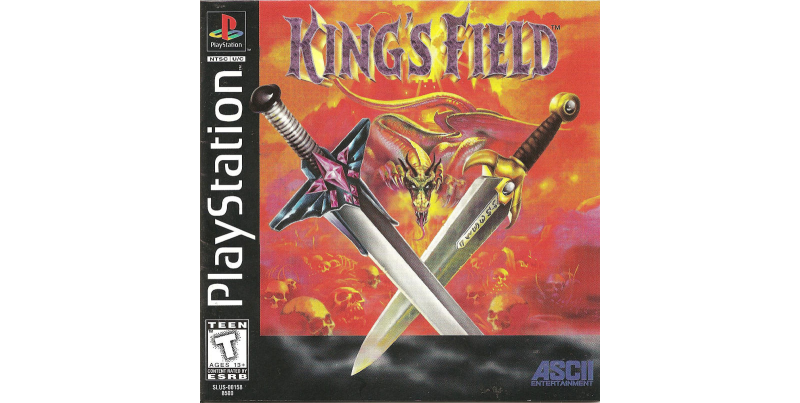
Game Name : King's Field (King's Field 2 in Japan)
Platform : Playstation 1
Release year : 1995
Genre : Action RPG
Developer : FromSoftware
Length : About 20-25 hours
Very few games nowadays makes me go "Wow this was innovative for the time" because I've played most of the big innovations, whether it be Doom, Thief, Super Metroid, Mario 64,
name it, all the big bois that made games in the style of no one else before I've pretty much played already, and in the 3D first person department, I always thought Quake did it first,
and I absolutely love Quake, it's one of my favorite games of all time, but I would be lying if I didn't say King's Field on the Playstation legit blew my mind as a technical achievement.
Whilst some games that has gameplay similar to it was released prior to King's Field, such as Ultima and Arena, I find it undeniable that King's Field feels like a game of it's own category.
In comparison, people used to call first-person shooters Doom clones, well I guarantee you won't find a King's Field clone anywhere outside of FromSoftware's library, except perhaps Hungry Ghosts for the PS2. (If you do, please let me know because I want to play this shit right now).
Not only does King's Field runs on a PS1 rather than a PC, the first King's Field game, released only in Japan due to the PS1 not being released in the US yet, was released not only two years before Quake, but a mere few months after Doom 2.
That's quite impressive, considering King's Field had full 3D environments, weapons and monsters, whilst Doom 2 wasn't technically full 3D at all and essentially ran on an upgraded 1993 engine.
King's Field 2, which was simply named King's Field in the US, was still released a year prior to Quake, and was superior to KF1 in every way in the technical department.
On top of that, the game is below 100MB and it has absolutely no loadings except the initial one when you boot the game, an exceedingly rare feat for the PS1.
Of course, there are loadings, but they are hidden behind a small walk between zones, which makes it feel organic and keeps the pacing the whole way, kind of like how Symphony of the Night treats loadings, except it never freezes in your face to finish loading.
Now, technical prowess aside, let's talk about the game itself, and brace yourself as this is one of my longest texts yet.
Unless you're new to this site or you've never spoken with me about games, you know that my favorite genre are RPGs in nearly all shapes and sizes, and if you know me further,
you'll know the two RPG genres I affectionnate the most are dungeon crawlers and hardcore ARPGs, so imagine my delight when I started up King's Field and realised it was both!
King's Field was FromSoftware's first video game project, and it definitely shows that they had some seriously competent programmers on board because I haven't encountered a single bug in my entire playthrough,
save for small visual ones. I even tried to find ways to exploit the engine but didn't find anything that could advantage me, so kudos on not only making a somewhat revolutionary game, but making it stable as well is great work!
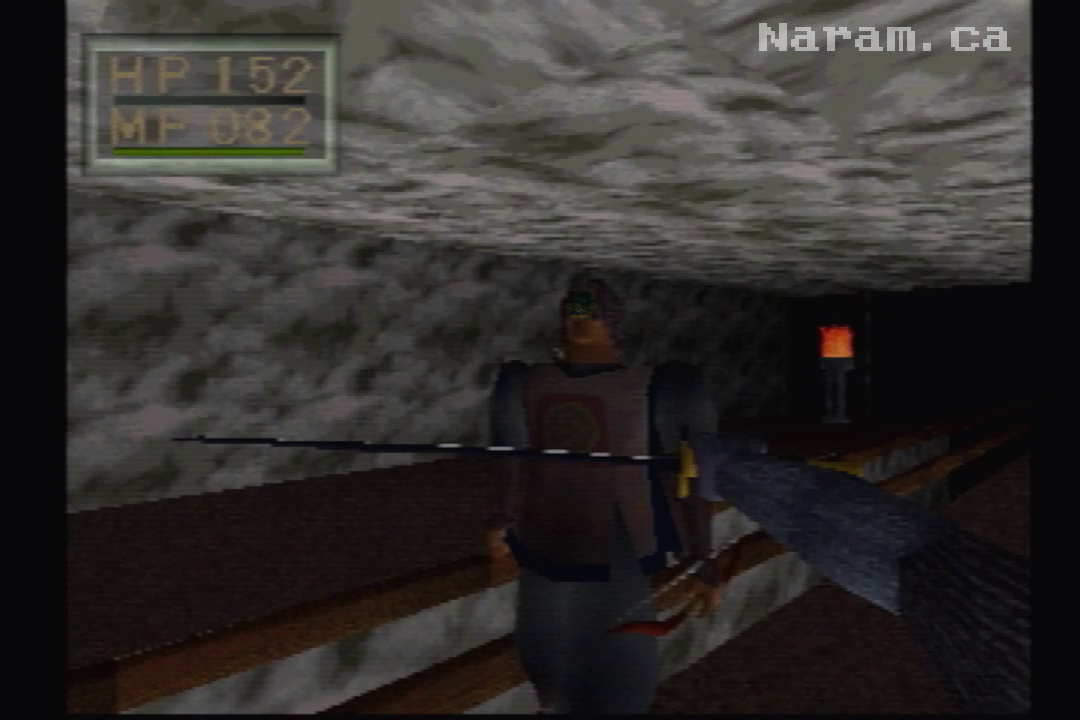
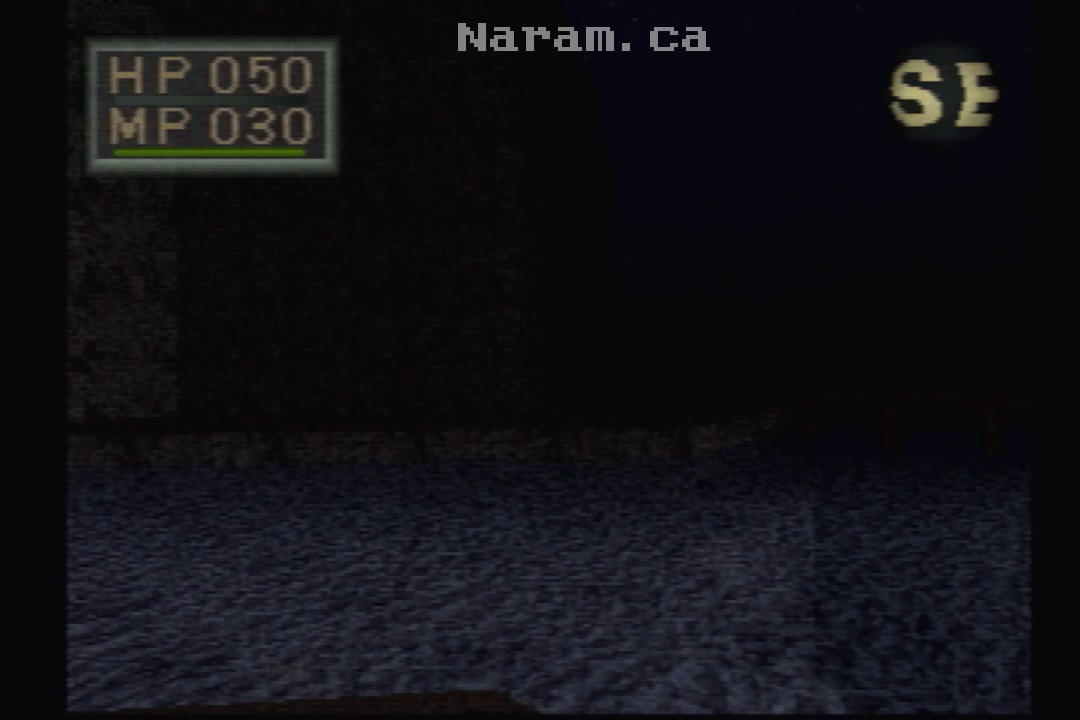
The premise is, you are Alexander, a close friend to the king of Verdite who sets out on an adventure to the island of Melanat, which is said to be cursed by a greater entity.
You are in search of the Moonlight Sword, in hopes of bringing it back to it's rightful owner, the king of Verdite. It is said that everyone who enters the island, or those who live there now, can never leave it.
As you begin the game, you spawn onto the shore of the island, immediatly greeted by a giant kraken to the left, which pounds you into dust in a matter of a second, or a fisherman on the right.
The fisherman explains to the player that he cannot believe you survived the shipwreck and that nobody ever makes it on the island alive, amongst other things.
The storyline is very simple and is told through the game via text markings on the walls, NPCs and world building, and still feels quite interesting despite it's simplicity.
As you navigate through the island, you quickly realize that you're left with several paths to take, giving the game a non-linear feeling of exploration, even though there is only two critical paths at most at all times,
if you're going in without a guide as you should, you're going to get lost and take risks often, occasionally to reap fair rewards, and that's just an absolutely fantastic way to experience this game.
The feeling is similar to playing Dark Souls 1 for the first time, getting lost in what is essentially a very large interconnected map with little to no ways of warping and using your
navigational skills to get out of the numerous sticky situations the game throws at you. King's Field's map contains pretty much the entire array of stuff that makes a dungeon fun.
Trapdoors, swinging blades, conveniently placed pits, secrets, secrets inside secrets, fake secrets, trapped chests, it ticks nearly everything on the list.
The game also gets plus points for being an RPG rather than an action-adventure game with RPG elements, because as you start the game, you have nothing but a dagger, and on top of that, you are a puny naked weakling that dies in barely two hits,
and as you survive the island, you get increasingly stronger, until one point where you're a badass with brutal weapons, spells and armor. That's not to say the game is or gets easy, far from it.
Despite the fact that the AI can be a bit slow on their toes, they will mercilessly beat you to a pulp if you're not careful, patterns are relatively easy to learn but having to dodge several melee attacks coming from multiple foes all whilst
being shot spells at can be quite a meticulous job to manage. There is also a fair variety of enemies for the year and the difficulty curve is well balanced, so long as you don't deviate too much from the intended paths at your current level.
I recall a specific part where it's just a small cramped hallway with swinging blades in the middle and chests behind them in a small room, which I promptly ran into with no healing items left,
and while you can avoid the blades by timing your movement in between them swinging, you definitely cannot do it while in combat unless you're super quick witted. As soon as you cross the blades and go for the chests, not only are the chests trapped,
three skeletons come out and begin swinging at you. This is the kind of shit that makes you double think your decisions, I made it out alive (barely) but I certainly feared for my last 20 minutes of progress being lost to a reckless death.
Resource management is crucial in King's Field, almost as much as a survival horror game, because gold is somewhat scarce and there are so many useful things you can buy with your gold that you have to do good decisions on what to buy.
The game gives a fair amount of items for your survival if you search the dungeons well and explore thoroughly, but unlike most RPGs, you'll be using those items somewhat regularly due to the overall difficulty of the game,
which is a nice change of pace from all those RPGs where you end the game with 700 potions you never ever use. You'll often run out of healing herbs early on and you'll probably be scraping your small change to buy some just so you can progress,
and that's what made me love this game even more, you start the game and you're nothing, just a novice battlemage adventuring in a world that doesn't hold your hand nor care about you or your feelings.
You'll die and will learn from your mistakes often whilst retaining enough of a challenge so you don't plow through recklessly even when you've thoroughly learned the area you are in.
Even if you spend a ton of time exploring the game, there's a high chance that you'll miss a bunch of stuff. There is definitely a lot of secrets that can be easily missed, sealed doors that aren't easy to figure out how to open,
there's a secret behind a waterfall locked off by some sort of mechanism I never understood how to open, as well as a big room with what seemed to be an altar which required two keys that I've personally didn't find in my playthrough,
so anyone digging into this game, don't expect to find everything on your first playthrough, because the size of this adventure and world map is surprisingly large, especially for a single-disc PS1 game.
The main way of fast-travelling in the game is through 'guideposts' in every save room in the game (except the last one) which acts as gateways, you find keys and matching gates as you play,
and you have to put a key into a guidepost then use the matching gate to teleport to that gateway, which costs 10MP. I believe there's a total of three in the entire game, but there could be more I'm not aware of.
Thing is you shouldn't just put keys anywhere you want, you have to put it in a strategic place that's somewhat of a safe spot, because if you want to warp out of a dangerous situation and you're almost out of health,
you don't want to be next to a cave full of enemies, you want to be close to a water source (which replenishes your health) and/or a town which has supplies for sale.
Unlike most games, your items have absolutely no description whatsoever. You find out what they do by using them. There is also a woman that travels the map with a crystal ball which can give you a description of any item in your inventory,
which I thought was a neat touch and a good way of putting ingame storytelling forward by not only giving you tips on what your items do, but also a bit of backstory on them, if applicable.
The game, in a way, kinda feels like a metroidvania at times as well, and the keyword is "kinda", because it certainly isn't one. At one point the map opens up a lot and there are several places where you can clearly go but you need an extra item to proceed,
although it usually does not block progress altogether because there's almost always multiple paths, and when you find said item (Specifically thinking of the flute in this scenario in case you've played this before),
you get the sudden realisation that you just unlocked like six new paths in various areas, which certainly gives off a metroidvania'ey vibe!
In fact, the whole game gives out this aura of constant mystery and the whole experience feels so mystical and memorable in retrospect. It just has this odd charm older RPG games have.
The music is quite catchy and fitting for the game. It definitely doesn't contain any bangers, but the ending music is certainly one to remember. Most tracks feel tense, which fits the game quite well.
One particular aspect of King's Field that's lacking are some of the visuals, the textures are mushy and repetitive and everything is really blocky, and it's fully understandable why they had to make the game look this way.
If you try making a fully 3D game on a machine with 2MB of RAM and a 33MHz processor in 1995 that has seamless loadings and a world as big as this one, naturally you're going to have to cut corners somewhere so the game can run on such a low-spec machine,
so if you have to cut something, by all means cut off graphic fidelity because it's definitely the least important part of an interesting game, and King's Field is a good example of that.
It's a game that, by yesteryear's standards, must've been so bloody impressive to see back then, the whole craze was around shiny new 3D engines, and as far as "shiny new 3D engines" go, no doubt that King's Field delivered back in '95.
Another thing that's really bad are the controls. Honestly, you get used to them quite quickly if you just give them a chance, but any regular player that hops into the game randomly would find those controls absolutely horrible, and understandably so.
This was made before DualShocks were a thing, so brace yourself with using R2 to look down and L2 to look up. The rest really isn't that bad, D-Pad to go forward/backward and turn around, and L1/R1 to strafe.
Standard stuff for the era, even Medal of Honor on a non DualShock controlled like this. It's unintuitive if you compare it to today's dual-joystick controls, but if you play for like an hour, it should become second nature quickly.
I'm not sure why, but the subsequent games on the same engine still used that control scheme, even the PS2 ones, so if you want to dig deeper into FromSoftware's older catalog of games, get used to it.
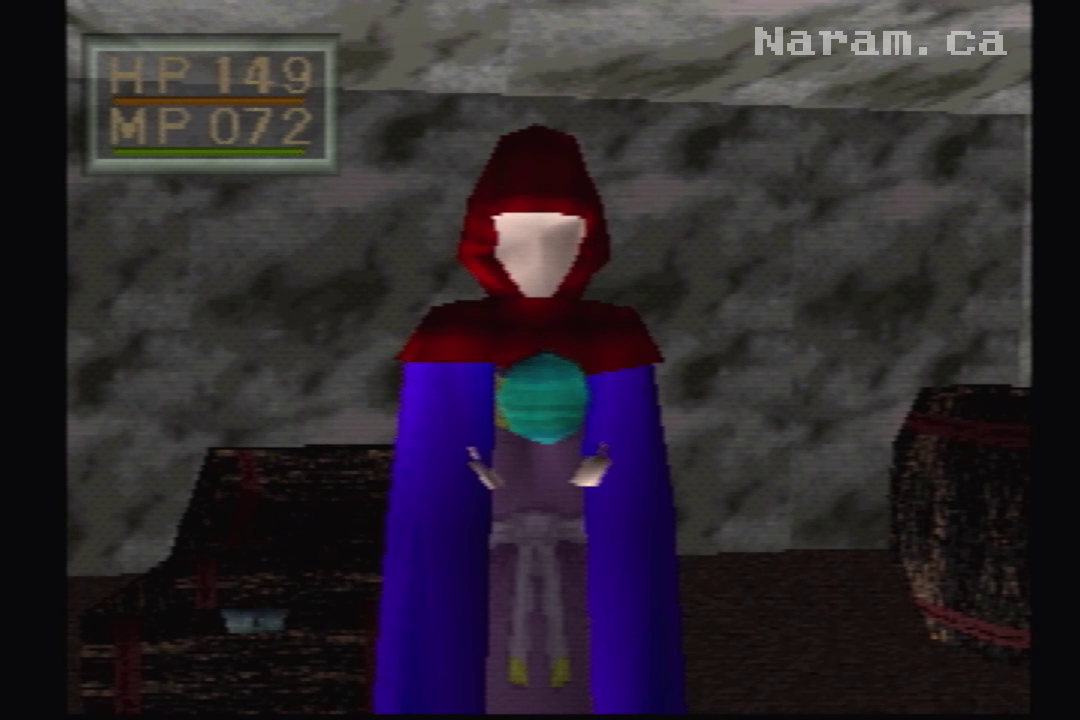
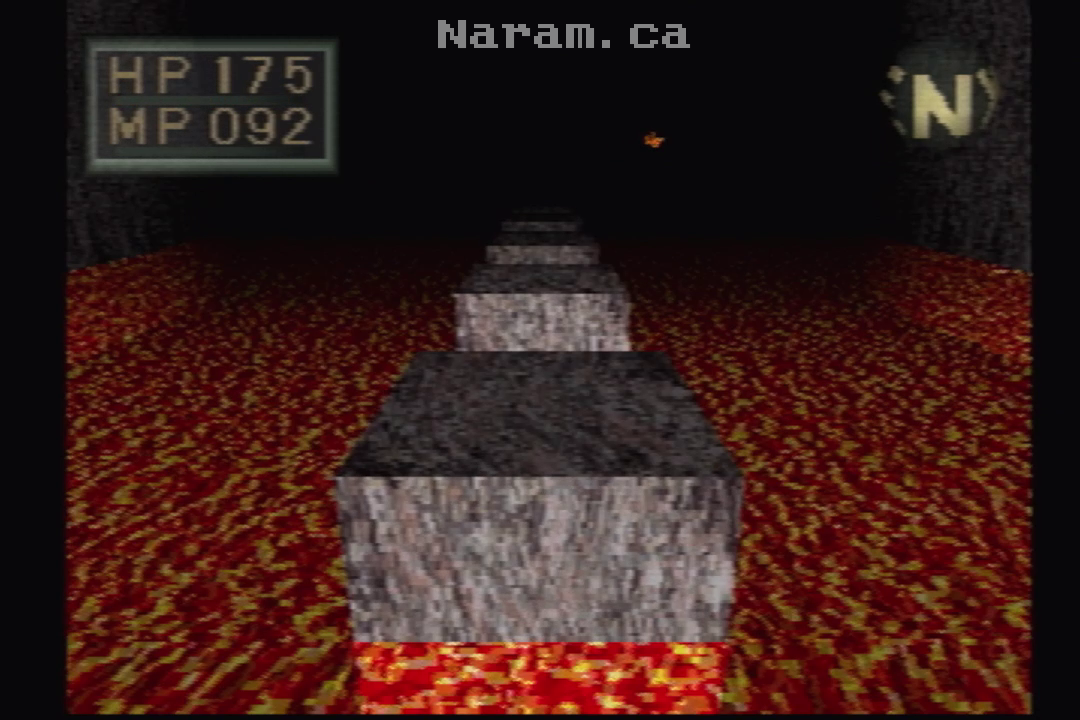
A little bit more extra information about King's Field that's worth noting before moving on to the conclusion : To my great surprise, I found out a few months ago that FromSoftware actually released a full set of tools for making King's Field clones,
and that the licence is basically public domain, you can release a King's Field game commercially with this tool. It's called Sword of Moonlight, and to further my surprise,
there is to this day a small but dedicated community working on games as well as modernising the tools and making sure it never gets obsoleted by advancing computer technology. While the toolset was released exclusively in Japan,
it has since been translated in English by the members of said community. I've tried the tools and while they are harsh and clunky, they are somewhat quite comprehensive and is far more than a mere level editor.
I wouldn't have the patience to make a whole game with them personally, but I think it's simply amazing that FromSoft were that keen into modding, especially for a series that never even made it off the PlayStation.
A sample but complete version of King's Field 1 was also bundled with the software, playable on PC with enhanced visuals. If you'd like to learn more about Sword of Moonlight, I will include links at the end of this page.
Even though I have high praise for this game and I've really thorougly enjoyed it, I am not ready to recommend it to everybody. It's a very punishing experience not catered to the casual or even experienced gamer.
Whilst the rough controls are compensated by slow AI with the same handicaps you have, the game's severe slowdowns, complete lack of handholding and item descriptions, limited ingame maps, numerous well hidden secrets,
brutal level design and meticulous combat only warrants the audience of the most seasoned, hardcore players who aren't afraid of the occassional 12FPS, getting absolutely lost and loading a save file 15 minutes back due to failure.
Those with a keen eye for immersive RPGs with interesting game design and unique experiences will most likely enjoy this, and is best enjoyed without any guide.
Despite it's flaws, it is a fantastic game, and a nice dive into a prototype of what FromSoftware had in store for the world next.
There were two more King's Field games released in the US, namely the third one titled King's Field 2 for the PSX and King's Field 4, named King's Field The Ancient City for the PS2,
and no doubt in my mind that I will play through those as well, because no other game feels quite like King's Field, even to this day. It may have some glaring issues, but any fans of dungeon crawlers or hardcore/obscure japanese games will likely love this.
If I knew of this game's existence when I was younger, there's no doubt in my mind that I would've played it to absolute death until the disc wouldn't read anymore, learning every nook and cranny of it. It was that fascinating to me.
+Unique experience with great atmosphere
+Numerous secrets to uncover in a vast, interconnected world
+Good level of challenge and risk/reward ratio in most cases
~Some aspects didn't age well, but doesn't take away from the core experience
-Tanky performance and barebones textures
-Very primitive controls and slow pace of gameplay
Overall rating : A
Gameplay : B-
Storyline (If present) : B+
Sound Effects : A
Music : B
Game/Level design : A+
Art style/direction : C-
Overall accessibility to a regular gamer : Very low
Ideal for dungeon-crawler fans and the most hardcore ARPG players
King's Field design tools, Sword of Moonlight links :
Sword of Moonlight's main fan website (I think?)
Another SoM website that is still updated and has a modified build of the tool
SoM Wiki